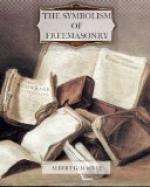[145] Ulmann, for instance, distinguishes between a myth and a legend—the former containing, to a great degree, fiction combined with history, and the latter having but a few faint echoes of mythical history.
[146] In his “Prolegomena zu einer wissenshaftlichen Mythologie,” cap. iv. This valuable work was translated in 1844, by Mr. John Leitch.
[147] Historical Landmarks, i. 53.
[148] See an article, by the author, on “The Unwritten Landmarks of Freemasonry,” in the first volume of the Masonic Miscellany, in which this subject is treated at considerable length.
[149] As a matter of some interest to the curious reader, I insert the legend as published in the Gentleman’s Magazine of June, 1815, from, it is said, a parchment roll supposed to have been written early in the seventeenth century, and which, if so, was in all probability copied from one of an older date:—
“Moreover, when Abraham and Sara his wife went into Egipt, there he taught the Seaven Scyences to the Egiptians; and he had a worthy Scoller that height Ewclyde, and he learned right well, and was a master of all the vij Sciences liberall. And in his dayes it befell that the lord and the estates of the realme had soe many sonns that they had gotten some by their wifes and some by other ladyes of the realme; for that land is a hott land and a plentious of generacion. And they had not competent livehode to find with their children; wherefor they made much care. And then the King of the land made a great counsell and a parliament, to witt, how they might find their children honestly as gentlemen. And they could find no manner of good way. And then they did crye through all the realme, if there were any man that could enforme them, that he should come to them, and he should be soe rewarded for his travail, that he should hold him pleased.
“After that this cry was made, then came this worthy clarke Ewclyde, and said to the King and to all his great lords: ’If yee will, take me your children to governe, and to teach them one of the Seaven Scyences, wherewith they may live honestly as gentlemen should, under a condicion that yee will grant mee and them a commission that I may have power to rule them after the manner that the science ought to be ruled.’ And that the Kinge and all his counsell granted to him anone, and sealed their commission. And then this worthy tooke to him these lords’ sonns, and taught them the science of Geometric in practice, for to work in stones all manner of worthy worke that belongeth to buildinge churches, temples, castells, towres, and mannors, and all other manner of buildings.”
[150] Ancient Egypt under the Pharaohs, vol. I p. 393.
[151] 1 Kings vi. 8.
[152] An allusion to this symbolism is retained in one of the well-known mottoes of the order—“Lux e tenebris.”




